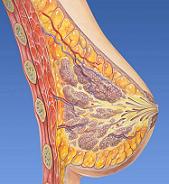Physical activity reduces the risk of invasive breast cancer
Feb 15, 2007 - 10:21:07 AM
, Reviewed by: Dr. Rashmi Yadav
|
|
|
"A woman's hormone levels naturally fluctuate throughout her life, and we have found that exercise likely offers protection against breast cancer regardless of a woman's stage in life."
|
By American Association for Cancer Research,
[RxPG]
 |
|
The results provide further evidence that for most women physical activity may reduce the risk of invasive breast cancer, the researchers concluded. |
Six or more hours per week of strenuous recreational activity may reduce the risks of invasive breast cancer by 23 percent, according to researchers from the University of Wisconsin Paul P. Carbone Comprehensive Cancer Center (UWCCC). Their report in the February issue of Cancer Epidemiology Biomarkers & Prevention, based on a survey of over 15,000 women, shows that exercise has a protective effect against invasive breast cancer throughout a womans lifetime.
The results provide further evidence that for most women physical activity may reduce the risk of invasive breast cancer, the researchers concluded.
To gain further insights into the mechanisms of risk reduction for breast cancer, the researchers investigated the relationship between physical activity and breast cancer risk in a population-based case control study in Massachusetts, New Hampshire, and Wisconsin.
During structured telephone interviews, the researchers questioned 7,630 women without breast cancer, 1,689 survivors of in situ, or non-invasive, breast cancer and 6,391 survivors of invasive breast cancer, all between the ages of 20 and 69. They asked detailed questions about physical activity, occupation, family history of breast cancer, menopausal status, and body mass index.
According to the researchers, women who exercised had a reduced risk of developing invasive breast cancer provided they didnt have a family history of breast cancer. This reduction in risk was apparent whether the physical activity took place early in life, in the postmenopausal years, or in the recent past.
"A woman's hormone levels naturally fluctuate throughout her life, and we have found that exercise likely offers protection against breast cancer regardless of a woman's stage in life," said Brian Sprague, a UWCCC research assistant and lead author of the study. "The take-home message for women should be that it is never too late to begin exercising."
Previous research has linked high levels of estrogen to an increased risk for developing breast cancer. Women who exercise heavily are, in general, older at the time of the first period, and tend to have irregular periods and a shortened estrogen-producing phase, which translates in a lower body exposure to estrogen, the researchers say.
Similarly, postmenopausal women who are physically active have also been shown to have lower levels of estrogen. This reduction may explain why increased physical activity reduces the risk of breast cancer, according to Amy Trentham-Dietz assistant professor at the University of Wisconsin-Madison and member of the University of Wisconsin Paul P. Carbone Comprehensive Cancer Center. Other potential mechanisms include prevention of weight gain, regulation of insulin sensitivity and alterations in immune function.
Taking all these factors into consideration, "intervention studies assessing the effect of physical activity on estrogen and other hormone exposure, and other biomarkers of risk would provide valuable insights on the mechanisms of physical activity in reducing breast cancer risk," said Trentham-Dietz.
"Further studies of population subgroups are necessary to gain a better understanding of the relation of physical activity to breast cancer risk, and to identify the groups most likely to gain benefit from it," said Trentham-Dietz. "Future research should also consider household activity in addition to recreational and occupational activities."
Advertise in this space for $10 per month.
Contact us today.
|
 |
|
Subscribe to Breast Cancer Newsletter
|
|
|
|
About Dr. Rashmi Yadav
|
This news story has been reviewed by Dr. Rashmi Yadav before its publication on RxPG News website. Dr. Rashmi Yadav, MBBS, is a senior editor for RxPG News. In her position she is responsible for managing special correspondents and the surgery section of the website. Her areas of special interest include cardiothoracic surgery and interventional radiology.
RxPG News is committed to promotion and implementation of Evidence Based Medical Journalism in all channels of mass media including internet.
|
|
Additional information about the news article
|
The mission of the American Association for Cancer Research is to prevent and cure cancer. Founded in 1907, AACR is the world's oldest and largest professional organization dedicated to advancing cancer research. The membership includes more than 24,000 basic, translational, and clinical researchers; health care professionals; and cancer survivors and advocates in the United States and more than 70 other countries. AACR marshals the full spectrum of expertise from the cancer community to accelerate progress in the prevention, diagnosis and treatment of cancer through high-quality scientific and educational programs. It funds innovative, meritorious research grants. The AACR Annual Meeting attracts more than 17,000 participants who share the latest discoveries and developments in the field. Special Conferences throughout the year present novel data across a wide variety of topics in cancer research, treatment, and patient care. AACR publishes five major peer-reviewed journals: Cancer Research; Clinical Cancer Research; Molecular Cancer Therapeutics; Molecular Cancer Research; and Cancer Epidemiology, Biomarkers & Prevention. Its most recent publication, CR, is a magazine for cancer survivors, patient advocates, their families, physicians, and scientists. It provides a forum for sharing essential, evidence-based information and perspectives on progress in cancer research, survivorship, and advocacy.
|
|
Feedback
|
For any corrections of factual information, to contact the editors or to send
any medical news or health news press releases, use
feedback form
|
Top of Page
|



